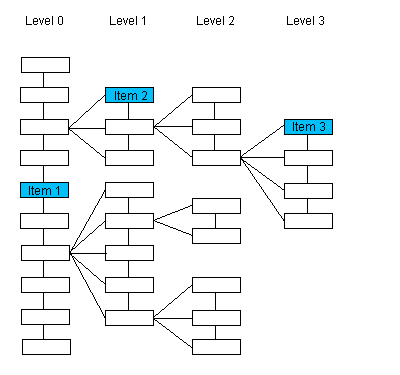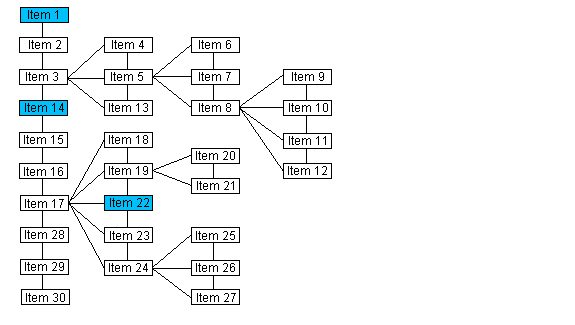
L_DicomFindLastKey
#include "ltdic.h"
pDICOMELEMENT EXT_FUNCTION L_DicomFindLastKey(hDS, pElement, pszKey, bTree)
|
HDICOMDS hDS; |
/* a DICOM handle */ |
|
pDICOMELEMENT pElement; |
/* pointer to a DICOMELEMENT structure */ |
|
L_CHAR * pszKey; |
/* type of key element to find */ |
|
L_BOOL bTree; |
/* flag that indicates how to evaluate the Data Set */ |
Returns a pointer to the last item in the Dicom Dir Data Set with the specified key element type.
|
Parameter |
Description | |
|
hDS |
A DICOM handle. | |
|
pElement |
Pointer to a DICOMELEMENT structure within the Data Set. | |
|
pszKey |
Character string that contains the type of key element to find. Possible values are: | |
|
|
Value |
Meaning |
|
|
"PATIENT" |
Patient key element |
|
|
"STUDY" |
Study key element |
|
|
"SERIES" |
Series key element |
|
|
"IMAGE" |
Image key element |
|
|
"OVERLAY" |
Overlay key element |
|
|
"MODALITY LUT" |
Modality-LUT key element |
|
|
"VOI LUT" |
VOI-LUT key element |
|
|
"CURVE" |
Curve key element |
|
|
"STORED PRINT" |
Stored print key element |
|
|
"RT DOSE" |
RT dose key element |
|
|
"RT STRUCTURE SET" |
RT structure set key element |
|
|
"RT PLAN" |
RT plan key element |
|
|
"RT TREAT RECORD" |
RT treatment record key element |
|
|
"TOPIC" |
Topic key element |
|
|
"VISIT" |
Visit key element |
|
|
"RESULTS" |
Results key element |
|
|
"INTERPRETATION" |
Interpretation key element |
|
|
"STUDY COMPONENT" |
Study Component key element |
|
|
"PRESENTATION" |
Presentation key element |
|
|
"WAVEFORM" |
Waveform key element |
|
|
"SR DOCUMENT" |
Structured Reporting Document key element |
|
|
"PRIVATE" |
Private key element |
|
bTree |
Flag that indicates how the Data Set will be evaluated. Possible values are: | |
|
|
Value |
Meaning |
|
|
TRUE |
Evaluate the Data Set as a tree. |
|
|
FALSE |
Evaluate the Data Set as a list. |
Returns
|
!NULL |
A pointer to a DICOMELEMENT structure that contains the last item in the Data Set with the specified key element type. |
|
NULL |
An item with the specified key element type was not found. |
Comments
If the Data Set is evaluated as a tree structure, this function returns the last item on the same level as pElement with the same parent as pElement, that has has key element type pszKey.
For the sake of these illustrations, the order of siblings is top to bottom. Therefore last is the item closest to the bottom.
Please note that the numbering of the items of interest in this first illustration is arbitrary and does not imply order.

|
If the passed pointer points to : |
The function returns a pointer to : |
|
Item 1 |
The last sibling (same level, same parent) of Item 1 that has has key element type pszKey, if such an item exists. If such an item does not exist, the function returns NULL. Searching begins at the bottom. |
|
Item 2 |
The last sibling (same level, same parent) of Item 2 that has has key element type pszKey, if such an item exists. If such an item does not exist, the function returns NULL. Searching begins at the bottom. |
|
Item 3 |
The last sibling (same level, same parent) of Item 3 that has has key element type pszKey, if such an item exists. If such an item does not exist, the function returns NULL. Searching begins at the bottom. |
If the Data Set is evaluated as a list, this function returns the last item in the entire list that has has key element type pszKey. Searching begins at the bottom of the list.
For the sake of these illustrations, the order of siblings is top to bottom. Therefore last is the item closest to the bottom.
Please note that the numbering of the items in this illustration does indicate the order of the items when the Data Set is evaluated as a list.

|
If the passed pointer points to : |
The function returns a pointer to : |
|
Item 1 |
The last item in the list that has has key element type pszKey, if such an item exists. If an item with has key element type pszKey is not found, NULL is returned. Searching begins at the bottom. |
|
Item 14 |
The last item in the list that has has key element type pszKey, if such an item exists. If an item with has key element type pszKey is not found, NULL is returned. Searching begins at the bottom. |
|
Item 22 |
The last item in the list that has key element type pszKey, if such an item exists. If an item with has key element type pszKey is not found, NULL is returned. Searching begins at the bottom. |
The following functions will also help you find elements in the Data Set with a specific key element type:
Required DLLs and Libraries
|
LTDIC For a listing of the exact DLLs and Libraries needed, based on the toolkit version, refer to Files To Be Included With Your Application |
See Also
|
Functions: |
|
|
Topics: |
Example
For an example, refer to L_DicomInsertKey.